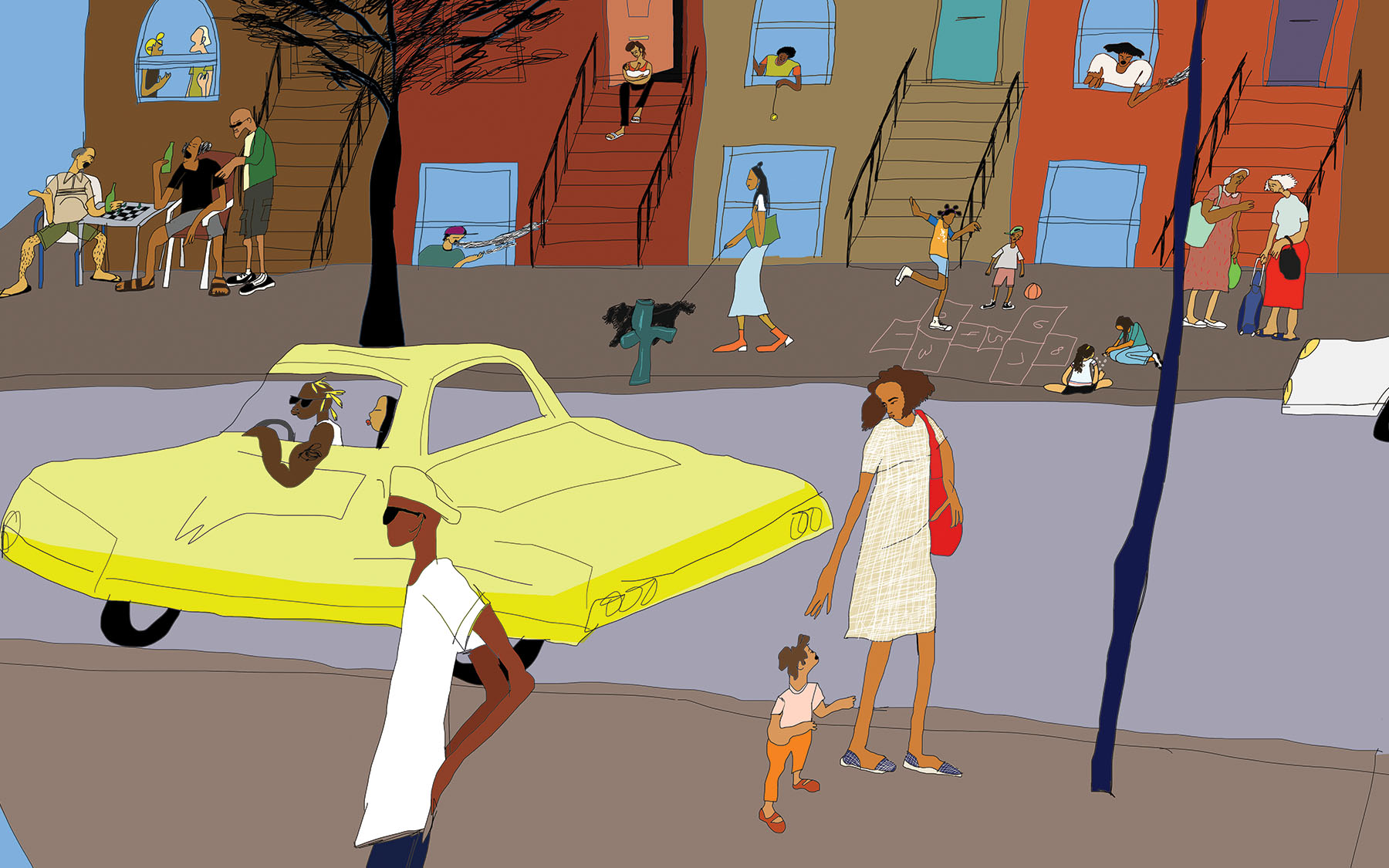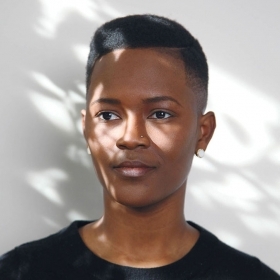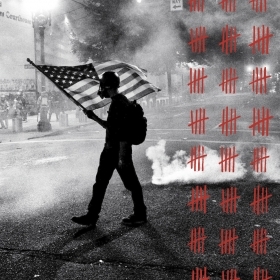Rana Zoe Mungin ’11 had always planned to be known—as a writer. She had not expected to become nationally famous as the face of the pandemic that has devastated New York and that continues to rampage around much of the globe. And yet, in late April, Mungin’s smiling face flashed on the screen of NBC News as it highlighted New Yorkers who had succumbed to COVID-19. ABC News anchor David Muir looked slightly stunned as he told viewers a bit about her. Her hometown newspapers—the New York Times, Post, and Daily News—agreed that hers was an especially poignant death. At barely 30, most of Zoe Mungin’s life and career had stretched before her—and then she was gone.
She shouldn’t have been. As President Paula Johnson wrote in an op-ed for CNN, “Her story has sparked widespread outrage in the media and beyond. It is one of systemic failures and missed opportunities, and all the more shocking because of her youth and promise.” Zoe Mungin—beloved daughter, sister, aunt, friend, teacher, Sailor Moon aficionada, hockey nut, and dog lover—had been a living example of the health inequities that plagued communities of color long before COVID-19 became a household word. The virus didn’t create them, but it starkly illuminated how great those differences are.
Some people were not surprised. “What happened to our Wellesley sister has happened a hundred times over, all around this country,” JudyAnn Bigby ’73 notes. Bigby, a Harvard-trained physician, has spent virtually her entire career treating, teaching, and researching the health needs of women and communities of color. She served as secretary of health and human services under Massachusetts Gov. Deval Patrick, and inequities in health care were a major focus. Sadly, she says, Mungin’s death wasn’t an isolated or unpredictable one: The intersection of race, class, and gender put Mungin squarely in the virus’s crosshairs. “There are people who will deny that care is rationed in this country,” Bigby says, “but it is, every day. When we think about who gets left out, we know who it is.”
Johnson agrees. Passage of the Affordable Care Act meant that some of those inequities were lessened, but they weren’t erased. “Access is much more than having an insurance card,” points out Johnson, who as a cardiologist and medical researcher often focused on women’s health needs. “It’s when you actually show up or when you present to your physician, or to a health-care facility, are your symptoms really looked at in a way that is equitable to someone who is white, if you’re a woman of color?” The data, she says, indicate the answer is “no.” (For more, see “An Unequal Pandemic,” below.)
It certainly felt that way in Mungin’s case. When she first began to feel sick with a fierce headache and fever, in mid-March, she went to Brookdale, the hospital closest to her East New York, Brooklyn, neighborhood. She wanted to be tested for COVID-19, but she was turned away. It’s probably your asthma, she was told. They sent her home with meds and instructions to rest. She returned via ambulance a few days later, and was refused testing again. Shortage of test kits. Could be a panic attack, an EMT told her, when she complained of difficulty breathing. (We know now that this one of the classic signs of COVID-19.) When she collapsed at home a day later, her sister Mia, a registered nurse, called an ambulance, and Mungin was returned to Brookdale. This time they tested her for COVID-19 and admitted her to the ICU.
By that time, she was deeply ill. “I think this idea that people didn’t understand how sick she was, I think that is not believable,” Bigby says. “They knew they were going to run out of beds or ventilators, and they were trying to figure out who was the most treatable. Let me put it that way.”
Mungin’s chronic asthma might have increased her vulnerability to the disease, and decreased her chances of surviving it. Her sister worked tirelessly to transfer Mungin to a Manhattan hospital for an experimental protocol, aided by the Wellesley network. (“Her Wellesley alumnae really stood with me in this struggle and this fight,” Mia later told CNN. “Without them making such an outreach for help, I don’t think that I ever would have received any help for her. Honestly.”) But despite it all, Mungin died a month later. Mia worries that she may have brought the virus home from work.

There have been dozens of studies done on how requests for medical care are often pushed aside because of staff’s mostly implicit bias. “Poor people, people of color,” Bigby says, “they’re mostly dismissed.” Especially women. “In the health-care system,” she continues, “there’s this feeling that Latinas, ‘over-excitable’ Black women, complain too much.” Their complaints aren’t taken seriously, and they go unaddressed.
As this issue was going to press, physician Sheila Butler ’80 wrote in Salon about the death of her sister, Harlem veterinarian Julie Butler ’79, from COVID-19, “Regardless of her medical standing, contributions to society, and level of education, my older sister Dr. Julie Butler still could not access timely assessment, COVID-19 testing, or medical care.”
And even celebrities have this experience: Serena Williams, multimillionaire tennis icon, gave several interviews after recovering from the emergency C-section birth of her daughter in 2017. She described to media outlets like CNN, The Guardian, and Vogue, for instance, how staff at her Florida hospital initially ignored her increasingly urgent demands for tests and medicine when she developed breathing difficulties a day after giving birth. (She’d experienced a severe pulmonary embolism a decade before and suspected this was a post-operative complication. It was—one that required several subsequent surgeries to correct.) Eventually, Williams was given the lifesaving treatment she’d requested earlier. But if a wealthy and globally known Black woman has this experience, imagine what happens to Black women who are neither.
Mungin was acutely aware of her status as a not-rich Black woman. She came to Wellesley because, of all the schools that accepted her (and all of them did), the College gave her a full ride, a combination of grants and loans, down to the $300 deposit to hold her place in the class. Even with that financial support, it was an adjustment. As a first-generation college student, and one from a family where there was ambition but absolutely no extra money, the non-academic side of Wellesley was challenging. In an interview in 2015 with the Wellesley Underground (WU), an alternative blog for alums that describes itself as “centering stories from our BIPOC, queer, trans/nonbinary, working class, neurodivergent, disabled, and undocumented siblings,” she shared this:
“It wasn’t until I went to Wellesley that I was made aware of how much my family didn’t have. I grew up in the hood, but I grew up in a house. I always had food to eat, the lights were always on, I always had new clothes for the start of school; new sneakers three or four times a year. It may not sound like much, but I had friends who grew up in the projects, who were homeless, who came to school just to get breakfast and lunch because there wasn’t anything for them at home. …” Mungin felt that few other Wellesley students could grasp her economic situation, let alone empathize with it: “I lived a few doors down from a woman who left Gucci flats in the hallway; in the other direction, there was a woman who left the receipt for her $210 bikini wax in the bathroom.”
She had friends, although money sometimes prevented her from hanging out with them:
“Some of my friends I made were able to go out for ice cream or order Lemon Thai whenever they wanted, and it doesn’t seem like a big deal,” Mungin told WU, “but when you’re 17, it really, really is. I was painfully aware that I didn’t have the right clothes and the right shoes. When I spoke, my New York accent was ‘too thick’; someone actually took me aside and explained that some people couldn’t understand me when I spoke.”
These things didn’t intimidate Mungin. She didn’t see it as her mission to educate her peers about class differences, but she wasn’t shy about pointing them out, either. Being poor, she said, was something that wasn’t talked about in any depth at Wellesley. Disadvantage is relative. Mungin told WU she once attended a forum called “Poor Little Rich Girl,” and discovered the title was literal—everyone was rich to one degree or another, except her. She didn’t have much use for it and didn’t go back. “It’s not anyone’s fault they’re rich,” she told WU, “but it’s always a problem when you’re poor. At Wellesley, we don’t talk about either.”
But she did in her writing. At Wellesley, Margaret Cezair-Thompson, a senior lecturer in English, encouraged Mungin to write her truth, even if that truth made white and/or middle-class readers confused or uncomfortable. “She had a strong voice of her own, which is something that often takes undergraduate writers, young writers, a while to discover,” emails Cezair-Thompson, who taught Mungin in her advanced fiction class. “And she had a subject that was all her own—compelling things she wanted to say.” There was work that still needed to be done in structure, Cezair-Thompson says, “but her voice was there, the subject was there, and most of all, that thing that tells me I’m reading the work of a great writer—authentic details.”
Mungin’s writing was crisp and to the point. It buzzed with the energy of East New York, her Brooklyn neighborhood that was mostly working class, and mostly Black and Latinx. Mungin herself was both, and identified as Afro-Latina. She wrote about her neighborhood, its bodegas and tiny take-out joints—Dominican, Puerto Rican, Jamaican—and its churches. Her people—a bodega owner, a neighborhood busybody, an exasperated mother trying to steer her daughter toward a better future—sounded real and three-dimensional.

“That can’t be estimated, how much she loved her community,” says Diamond Sharp ’11, who became friends with Mungin at Wellesley during their first year and remained close until her death. “I think that’s part of the reason she was living at home when she passed away. When I think of Zoe, I think of someone who rode very hard for her hood.” The two bonded early on over being writers. “That was an unusual path for Wellesley students,” Sharp says, focused as they often are on careers in business and science and things less ephemeral than the arts. Sharp eventually applied to an M.F.A. program “partly because of Zoe’s encouragement and her help. She walked me through the dos and don’ts [of the application process] and encouraged me to see creative writing as a possible future, post-college.”
Mungin’s M.F.A. was from the University of Massachusetts, Amherst, and although she received a fellowship and stipend, it came at considerable cost. “It’s not a secret that she didn’t have a good time at her program,” Sharp says.
That turns out to be an understatement. For her first two years, Mungin was the only Black person in the program, which had about 60 students. Molly McArdle, a class behind Mungin in the program, first talked to her when she was a prospective student. When the two met in person at UMass, they bonded almost immediately. “We had very similar taste in books. The allusions and the references that we made came from the same books,” she says. They were city kids who bemoaned spending three years in the bucolic Pioneer Valley—no good bagels, no subway, very little ethnic diversity. Mungin especially stuck out. “She was the darkest body in the room,” McArdle says, “something that she felt everywhere she went. As a white woman, I saw from an outside perspective the incredible burden this was, the physical weight of it.”
There were racial aggressions. One student, a white male, was particularly offensive. “He told her to her face that she could have gotten into any program in the country because she has ‘that Junot Díaz thing going,’” McArdle remembers. “He told her to her face he didn’t want to be in a workshop with her because she worried about Black people.” She says the same student walked up to Mungin one day and wordlessly licked her, and walked away as she stared after him, shocked.
With few exceptions, McArdle says that her M.F.A. cohort had little interest in—or understanding of—the people and lives Mungin was writing about, leading to agonizing moments. In a 2014 essay for Route Nine, the M.F.A. program’s literary magazine, Mungin described speaking up in an entirely white workshop class about a microagression she had experienced there. She wrote, “Calling my black female narrator ‘aggressive’ was problematic, and telling me that this ‘aggressive’ behavior needed to be substantiated by examples in the text—namely, that I needed to show ‘white people’ being racist to her, to explain why she behaved the way she did—was upsetting in many ways, and demonstrated the inability of this white audience to interact with characters from cultures other than their own with generosity. … I was told I should be worried about the integrity of the fiction I produced, namely, that the comments I received weren’t about race at all. Moreover, I was shouted at, something that has no place in any setting, let alone in a classroom. …” Seeing that no one stopped the student who was shouting, she left the class.
After Mungin spoke up about her experiences, there were consequences for her, according to McArdle. Mungin had to find professors outside her department to advise her on her thesis, because two M.F.A. advisors stood down. “The guy who had harassed her the previous year was going around telling people she’d had a mental breakdown and needed to go into therapy,” she recalls. Mungin finished her year, but it was excruciating. She ended up filing a complaint with the Massachusetts Commission Against Discrimination, but it was dismissed when the commission could not conclude that the law had been broken.
McArdle says that Mungin’s initial interest was in “getting a Ph.D., and she didn’t pursue that because she didn’t know anyone to write letters [of recommendation] for her.” But, she says, the lost dream of a doctorate was less significant than “the scar tissue of our experiences together [at the Amherst program].” She says the cumulative trauma they’d gone through—both the racist incidents and the attempt to address them—“changed our relationship to writing and changed our relationship to the industry. And what our dreams used to be. Our dreams changed,” she allows. “Our love of writing and our desire to write didn’t.”
Mungin was teaching social studies at Bushwick Ascend, a charter middle school in Brooklyn, when she became sick. It was a job she loved and where she felt she was meant to be. The beginning of this school year was particularly painful for many of her friends, who know how much she enjoyed teaching and how much her students loved her. Her best friend, Nohemi “Mimi” Maciel ’11, posted a note to Mungin on Facebook:
“Making your classroom welcoming and safe was your number one priority. I remember when you texted me about the ridiculous amount of pillows you got for your reading nook. ‘But Mimi, they were on sale! On sale!’ Your students meant the world to you, and I’m thinking of them.”
Her death affected people well beyond her family and her immediate circle of friends and coworkers. Mungin was active on several virtual Wellesley networks, including the Wags and Whiskers group on Facebook, where she often posted about her two pit bulls, Rosie and Bandit, and on Instagram. “People felt like they knew Zoe even though they hadn’t met her in person,” Sharp says.
Both Sharp and McArdle are particularly incensed that after Mungin’s death, UMass published a lengthy obituary. “She pushed the needle here at UMass on conversations about institutional racism; our programs, faculty, and students owe her a debt of gratitude for having spent time here and shared her knowledge, experience, and perspective,” it said.
“It’s safe to say she had a terrible time there,” says Sharp, “which made it really frustrating to see the school’s response to her death, because they didn’t do right by her when she was alive.”
“It was an incredible insult to how I remember Zoe and how Zoe characterized her time there,” McArdle agrees.
Somewhere on Mungin’s computer is part of a book that came from her UMass thesis, about a multigenerational, multicultural Brooklyn family. The title: Non Ministrari sed Ministrare. Margaret Cezair-Thompson hopes eventually the work will be recovered, edited, and published.
Sharp’s own volume of poetry will be published next year, and she is pained that Mungin won’t be here for that.
“It’s hard for me to thoroughly articulate the deep void her passing creates for me,” Sharp says. “That’s why my impending book release feels bittersweet. She should be here to see it, and I should be talking to you about her novel, not her death. Zoe’s goal was to publish her novel, and there was some interest from agents to represent her before her death. She was a serious writer, and the world is poorer for her loss.”










We ask that those who engage in Wellesley magazine's online community act with honesty, integrity, and respect. (Remember the honor code, alums?) We reserve the right to remove comments by impersonators or comments that are not civil and relevant to the subject at hand. By posting here, you are permitting Wellesley magazine to edit and republish your comment in all media. Please remember that all posts are public.